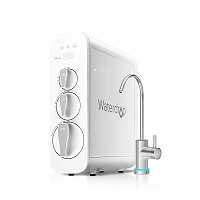Before you buy an Osmosis Water Filter, you may want to check out the reviews of the product. While some Osmosis systems are a fine choice for some individuals, many hear horror stories from consumers who were not prepared for these types of disadvantages and subsequently replace it with a less than adequate countertop water filter. In this article, we list the top things that hear tell from those who regret purchasing a reverse osmosis water dispenser. If you are looking for quality and peace of mind, be sure to review this information before making your final choice. Hopefully, after perusing the information in this article, you will be better informed to make the correct decision when choosing a countertop water filter for your home.
One of the things that many people do not consider is how to properly connect the reverse Osmosis Water Filters to their home’s water supply. If they did not include a connection of some kind, you may need to install a hose or electric outlet in order to attach it to your water tank. When selecting an outlet, keep it away from the water tank’s outlet. As an alternative, use a splitter port. You can find all the necessary information about this type of port on the internet. Many of the manufactures sell them separately.
While reverse osmosis is great at removing most contaminants, there are some contaminants that it is ineffective at removing. Chlorine, for one, is a very strong chemical, which means that it will leave chlorine gas in your drinking water. While you can add additional filtering to protect your family from chlorine gas, you should also install a carbon block or multi-media filter to further protect yourself and your family. In addition to eliminating chlorine gas, it will also remove sediments, trihalomethanes (THMs), volatile organic compounds (VOCs), and particulate matter. Carbon block and multi-media filters have the ability to trap more THMs than any other filtration system but don’t have the disadvantage of removing chlorination byproducts that are helpful to your health.
Granular activated carbon filters are also good choices. These filters trap many of the contaminants that granular activated carbon filters alone can’t. For example, these filters can trap chlorine, but also other common contaminants such as pesticides and herbicides. They do not trap major pharmaceuticals, such as antibiotics, so they are not necessarily less effective than other purification systems. However, they have the advantage of being more cost effective than other options.
Reverse osmosis filters are not effective at removing parasitic cysts, which are microscopic organisms that can live in the tiny pores of your pipe. These cysts are often resistant to most other types of filtration, so it is possible that a reverse osmosis filtering system would actually increase the levels of cysts present in the water. Reverse filtering does work, but it is better to purchase a product that traps both the microorganisms and the larger chemicals that are present.

The best choice for filtering your drinking supply is to purchase a multi-media unit that includes a granular activated carbon filter, a carbon block with sub micron sized straining holes, a sub-micron filter to remove the larger organics, a micron filter to remove the larger dissolved solids, and a deionization step. Any purification device can only do so much to protect you from chemical contamination. You need to look for a unit that includes a deionization step, especially if you are serviced by a public treatment facility. A deionization step will help remove toxic heavy metals, including lead.
Granular activated carbon and sub-micron filters work well because they trap the contaminants on granules. The larger particles are unable to pass through. If you use a reverse osmosis system, there will be an excess of larger compounds in your water. This is because these systems use a semi-permeable membrane to trap the smaller particles. Berkey pure offers one of the best membrane filtration systems because they use a porous ceramic design that traps the smaller compounds as well as the larger organics.
If you are serviced by a treatment facility, then look for one that uses a porous ceramic system for the purpose of reverse osmosis. They will provide the best protection against chemical contamination and organics. There are a number of companies that make and sell purification systems that include all of the above options. Berkey is just one of the manufacturers that have designed a unit that fits most home filtering systems.
